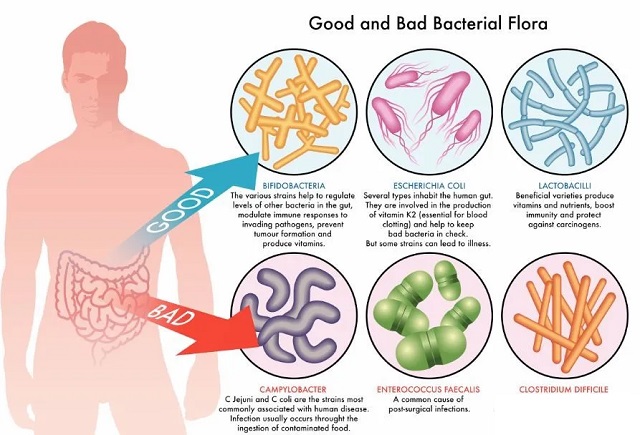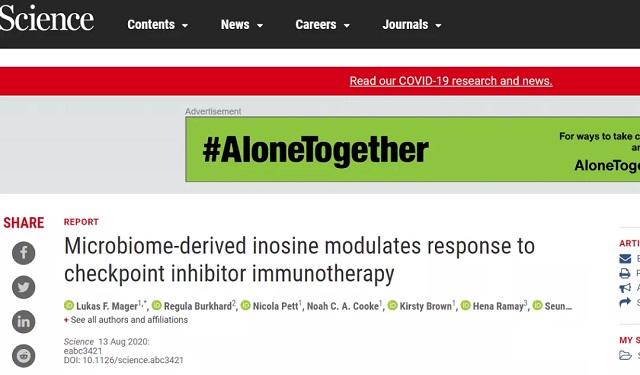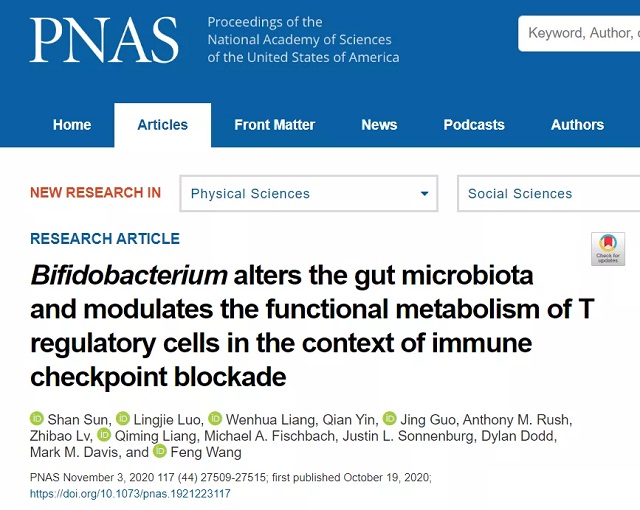The intestinal flora can improve cancer treatment and alleviate side effects
- Normal Liver Cells Found to Promote Cancer Metastasis to the Liver
- Nearly 80% Complete Remission: Breakthrough in ADC Anti-Tumor Treatment
- Vaccination Against Common Diseases May Prevent Dementia!
- New Alzheimer’s Disease (AD) Diagnosis and Staging Criteria
- Breakthrough in Alzheimer’s Disease: New Nasal Spray Halts Cognitive Decline by Targeting Toxic Protein
- Can the Tap Water at the Paris Olympics be Drunk Directly?
The intestinal flora can improve cancer treatment and alleviate side effects
- Should China be held legally responsible for the US’s $18 trillion COVID losses?
- CT Radiation Exposure Linked to Blood Cancer in Children and Adolescents
- FDA has mandated a top-level black box warning for all marketed CAR-T therapies
- Can people with high blood pressure eat peanuts?
- What is the difference between dopamine and dobutamine?
- How long can the patient live after heart stent surgery?
The intestinal flora can improve cancer treatment and alleviate side effects.
The intestinal flora contains powerful anti-cancer power! While improving the success rate of cancer treatment, can it also alleviate side effects? !
There were 3 research results related to intestinal flora published in the journal Science on January 5, 2018.
The article shows that the symbiotic microorganisms in the intestine may have a direct impact on the anti-tumor immunotherapy of human cancer patients, which undoubtedly provides us with new ideas and directions for the development of tumor precision treatment.
So, what is the condition of bacteria in the intestine? How are they related to tumors?
 The probiotics in the picture are Bifidobacterium, Escherichia coli, Lactobacillus;
The probiotics in the picture are Bifidobacterium, Escherichia coli, Lactobacillus;
The bad bacteria are Campylobacter, Enterococcus faecalis, Clostridium difficile
As we all know, there are microorganisms on the mucosal surface of almost all organs in the human body. There are about 1,000 species, and most of them exist in the intestine.
There are about 10^14 bacteria in the human intestine, which is 10 of the total number of human cells.
Moreover, studies have found that the microorganisms in the baby’s body have been transformed into the adult form at the age of 2 years, and then they become relatively stable, and their types and total amount are basically unchanged.
Different flora in the intestinal tract jointly maintain the microecological balance in the intestinal tract and participate in many functions of the human body such as digestion, metabolism, immune regulation, and energy conversion.
And many studies have shown that the microenvironment of the intestinal flora can affect the effectiveness of cancer treatment.
The editor reads a large number of domestic and foreign medical researches, and proves that the intestinal flora can not only improve the success rate of cancer treatment, but also alleviate the side effects caused by immunotherapy.
Amazing! The three major intestinal flora can increase the effect of immunotherapy by 4 times!
Recently, a new research report published in the international blockbuster journal “Science” caused a sensation again.
The researchers pointed out in the report that certain bacteria in the intestine may increase the efficacy of immunotherapy.
This discovery makes microbes Therapies may be incorporated into immunotherapy to better treat cancer.

In this latest study in 2020, researchers have made an amazing discovery that the use of intestinal bacteria can increase the effectiveness of cancer immunotherapy by 4 times! This is really incredible!
The first phase of this new research is to study the impact of specific bacteria on the efficacy of cancer immunotherapy.
In four mouse models of cancer, the researchers finally identified three intestinal flora associated with positive immunotherapy results: Bifidobacterium pseudomonas, Lactobacillus johnsonii, and Olsenia.
So how do these bacteria affect the results of immunotherapy?
Researchers have done further research and found that inosine, a metabolite of these bacteria, can effectively activate anti-tumor T cells in the body to attack tumors, eventually shrinking tumors, and even eliminate all colorectal cancers in some cases. cell.
This special mechanism finally allows researchers to understand how gut bacteria regulate the efficacy of cancer immunotherapy.
In addition, “Science” and “Nature” magazines reported many astonishing medical discoveries. Researchers conducted large-scale analysis of patients with different cancer types who had received PD-1 inhibitor treatment, and proved that gut microbes are used in immunotherapy. It does play a decisive role.
It was unexpectedly discovered that bifidobacteria can alleviate the side effects of cancer immunotherapy!
Immune checkpoint inhibitors are effective tumor immunotherapy methods, but recently it has been found in clinical applications that while the use of CTLA-4 and PD-1 and other immune checkpoint inhibitors to enhance the anti-cancer effect, it also indirectly breaks the immune balance.
This can cause diarrhea, colitis and even life-threatening autoimmune reactions.
On October 19, 2020, researchers from Shanghai Jiaotong University School of Medicine published a blockbuster article in the journal PNAS.
The study found that bifidobacteria can optimize symbiosis under the condition of immune checkpoint CTLA-4 blockade The composition of the flora and enhance the function and metabolism of intestinal regulatory T cells (Treg), thereby alleviating the intestinal inflammation induced by anti-CTLA-4 antibodies.

Bifidobacterium is one of the most common probiotics in food. In recent years, it has been frequently used as a selling point by major businesses.
Past studies have found that Bifidobacterium has the functions of regulating intestinal function and enhancing immunity.
This study also confirmed that bifidobacteria also play an active role in enteritis induced by immune checkpoint inhibitors.
Expert interpretation:
Bifidobacteria significantly reduce the side effects of immune checkpoint blocking tumor immunotherapy, and enhance the characteristics of multiple immune checkpoint antibody combined treatment effects, which will help optimize relevant clinical immunotherapy programs and improve the intestinal flora by using probiotic strains The structure has laid a solid theoretical foundation for improving the comprehensive effect of tumor immunotherapy.
According to recent studies, intestinal microbes can also significantly reduce the side effects of conventional therapies such as chemotherapy and radiotherapy, increase patient tolerance, and achieve better therapeutic effects.
Related Links: The “Almighty Dark Horse” for cancer treatment debuts! The intestinal flora can increase the success rate of radiotherapy, chemotherapy and immunotherapy!
Probiotics have many advantages, the most dazzling auxiliary anti-cancer effect
Although the research in this article is still in its early stages, the importance of intestinal flora and the benefits of probiotics have long been recognized.
Humans have been eating probiotics for more than two thousand years.
If the human body is compared to a bacterial country, then the intestine is no different from a “big city”, and more than 95% of these are probiotics.
Probiotics refer to a type of intestinal physiological bacteria that are beneficial to human life and health, such as lactic acid bacteria, bifidobacteria, streptococci, actinomycetes, yeasts, etc.
The Food and Agriculture Organization of the United Nations (FAO) and the World Health Organization (WHO) jointly define it as: living microorganisms that can produce health benefits when ingested in moderate amounts.
At present, cancer treatment methods include surgery, radiotherapy, chemotherapy, targeted therapy, immunotherapy and so on.
However, these treatments will more or less aggravate the gastrointestinal toxicity of patients and increase their pain and suffering.
Clinical studies have shown that the main clinical manifestations brought about by anti-cancer treatment are nausea, vomiting, loss of appetite, abdominal pain, constipation, and diarrhea.
In fact, as anti-cancer adjuvants, probiotics can regulate immune disorders after anti-cancer treatment, reduce drug toxicity, enhance the efficacy of chemotherapy and immunotherapy, and assist in improving the anti-cancer effect (including anti-tumor effects of the gastrointestinal tract). , Lung cancer, breast cancer, cervical cancer, oral cancer, tumors in other parts, etc.).
However, Do not use probiotics indiscriminately
Commercially available probiotics are common and believed to be beneficial to the gut and overall health.
However, another study proposed at SITC in 2018 pointed out that only “reasonable probiotics”, which are composed of reasonably manufactured viable bacteria, can be taken safely before treatment to ensure that patients meet expectations The response level.
Therefore, the effectiveness of probiotics on the market for cancer patients cannot be guaranteed.
Due to different genetic backgrounds, different dietary structures, and different climatic environments, there are big differences.
Therefore, the types of probiotics that inhabit the intestines of residents in different regions have certain regional specificities.
Therefore, cancer patients cannot choose probiotics arbitrarily. “Private customized” probiotics are specific strains screened for different diseases.
Taking strains tailored to their own conditions can significantly improve their condition.
After the personalized probiotics enter the intestinal tract, it will take about 3 months to eliminate harmful bacteria and toxins from the intestinal environment to establish a dominant strain.
After the intestinal tract establishes the dominant bacteria structure, the longer you eat, the better the effect will be.
It is best to eat it on an empty stomach in the morning and before going to bed.
United States MD Anderson starts clinical trials of oral probiotics!
The idea of making immunotherapy work through oral probiotics will officially enter the human clinical trial stage.
MRx0518 is composed of a live bio-freeze-dried formula of a special intestinal bacterial strain-Enterococcus gallinarum, which has been proven to have a strong immune stimulating effect in previous experiments.
This clinical trial was conducted by MD Anderson Cancer Center, the nation’s number one cancer center.
This phase I/II open-label clinical trial (NCT03637803) will recruit up to 132 patients with various types of solid tumors (non-small cell lung cancer, renal cell carcinoma, bladder cancer or melanoma).
In this study, the enrolled patients will be given intravenous infusion of pembrolizumab every 3 weeks until the disease progresses, side effects occur or withdrawal, up to 35 cycles (about 2 years).
From the day of the first pembrolizumab, the subjects took one pill of MR0518 twice a day until the end of the treatment period.
Sum up:
In the fields of cancer and immune diseases, adjusting the gut microbiome to improve efficacy is one of the hot research directions, but the controversy about probiotics will undoubtedly continue.
At the beginning of the year, the Journal of the American Medical Association (JAMA) and The Lancet Sub-journals also published editorials to discuss that individualized probiotic flora may be a future treatment strategy.
It is hoped that more and more of the doors of defeating cancer by regulating the autoimmune function of patients will be opened, so that patients will have more and better treatment options and prognosis.
References
1.https://www.pnas.org/content/117/44/27509
2.https://science.sciencemag.org/content/early/2020/08/12/science.abc3421
3.https://www.ncbi.nlm.nih.gov/pmc/articles/PMC6604670/
4.https://medicalxpress.com/news/2019-11-gut-ticket-chemo-side-effects.html
The intestinal flora can improve cancer treatment and alleviate side effects
(source:internet, reference only)
Disclaimer of medicaltrend.org
Important Note: The information provided is for informational purposes only and should not be considered as medical advice.



